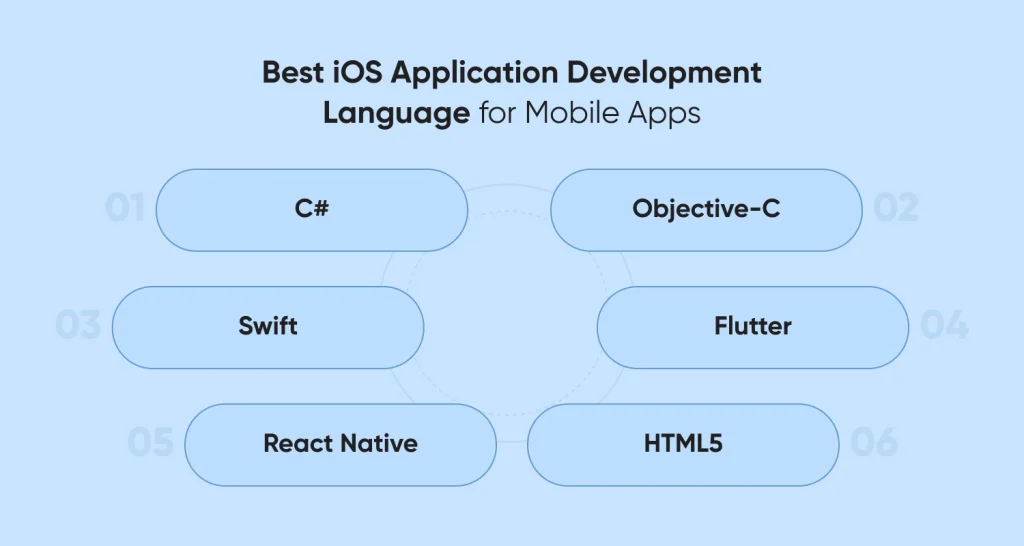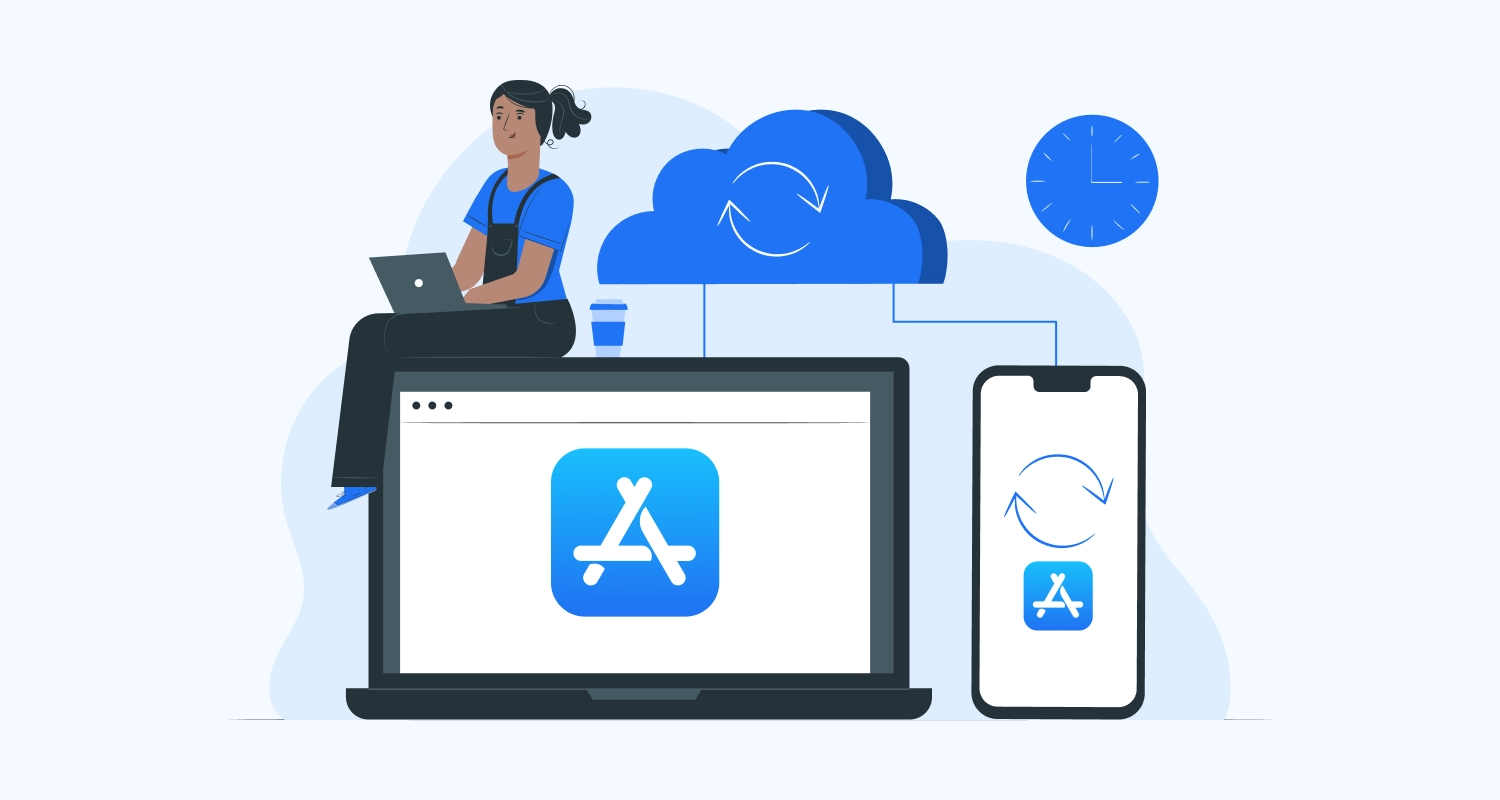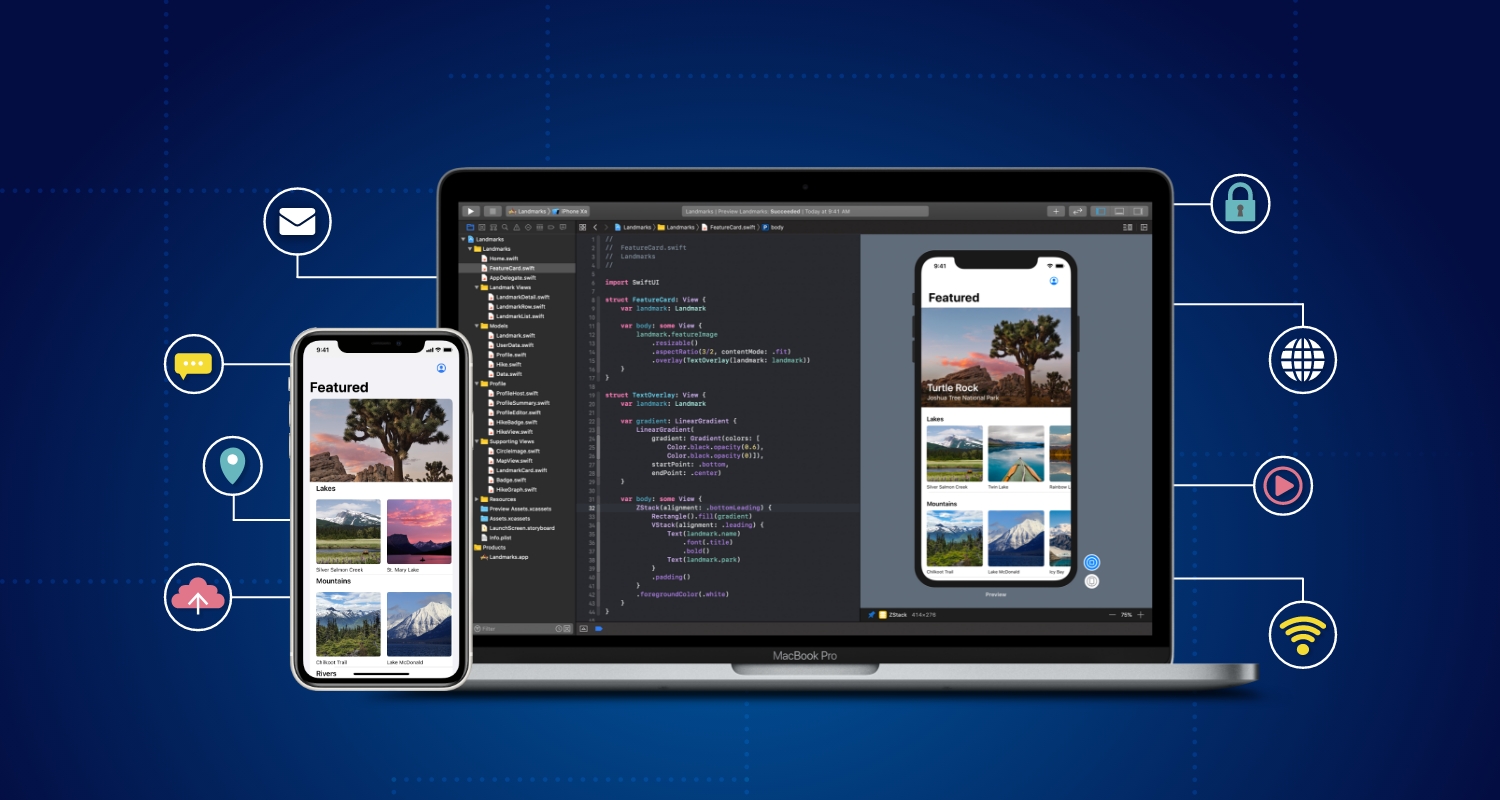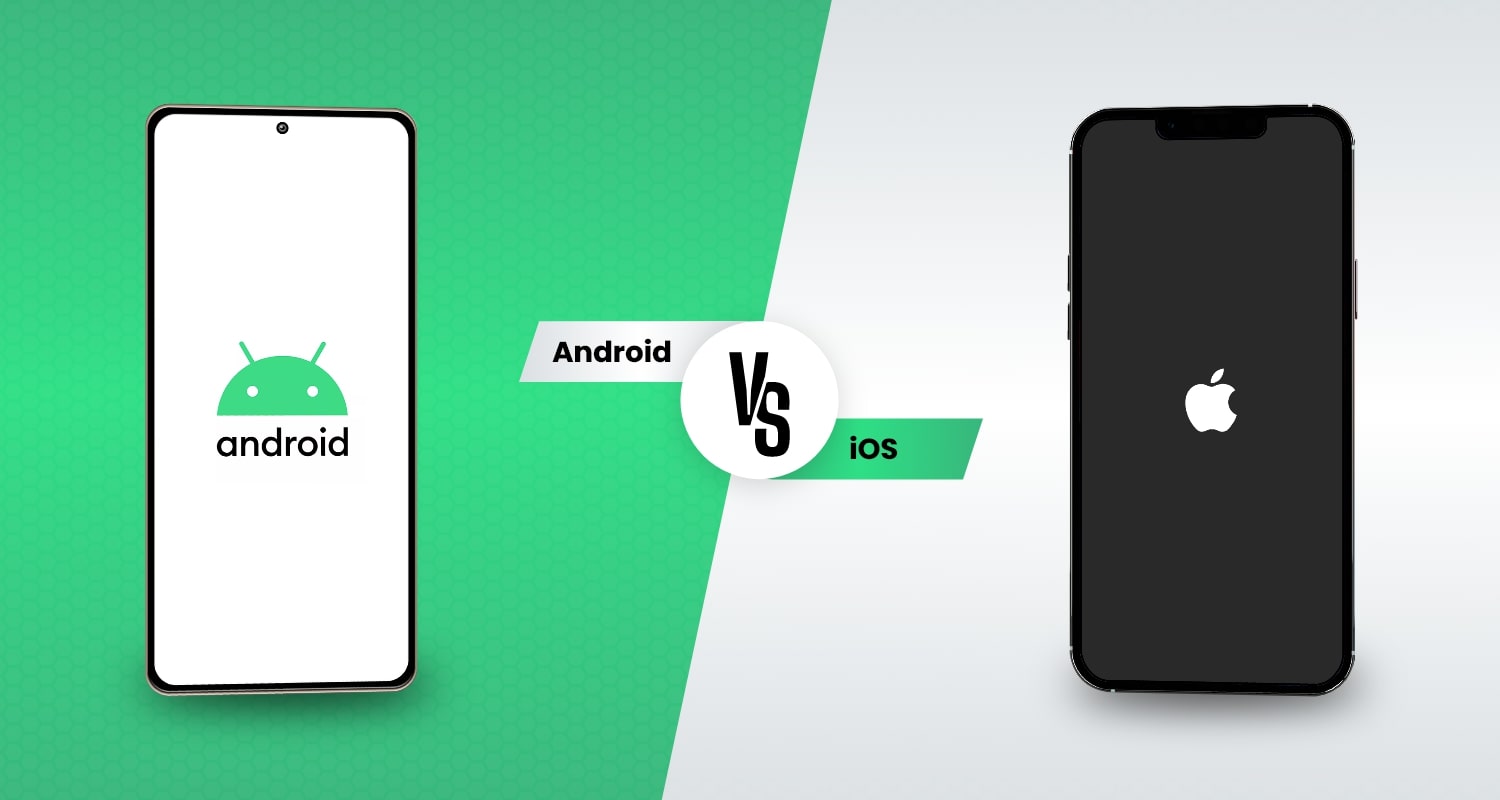By 2024, mobile apps should bring in more than $935 billion in revenue. The data indicates that there is significant competition in the iOS mobile application industry. Choosing the appropriate tool becomes crucial to ensuring flawless application execution.
As a top iOS app development business worldwide, we have expertise in creating unique iOS mobile apps, such as the YouTube intro video maker and roof management apps.
As a result, we decided to start a blog to assist you in choosing the top dynamic programming language for creating iOS applications.
This is the full blog about programming languages and frameworks for iOS app development, which covers everything you need to know. You can also read our blog on how to build an iOS app once you gain knowledge of the programming languages. Now let’s get started.
What is iOS App Development Language: A Simple Definition
The set of programming languages known as iOS is mostly used to create apps for Apple’s mobile devices, which include the iPhone, iPad, iWatch, and Apple TV. The most popular and extensively utilized programming language for making iOS applications is called Swift.
Objective-C is still significant and is utilized in ongoing iOS projects or for working with legacy codebases, even though Swift is the better option. Programmers working on iOS projects can utilize both languages interchangeably, facilitating a seamless shift and eventual assimilation of Swift.
Having established our understanding of an iOS programming language, let’s move on to another important topic: the best programming languages for developing an iPhone app.
Best iOS Application Development Language for Mobile Apps

Although millions of apps are published annually for the iOS platform through Apple’s App Store, the process of creating an app is not simple. Hire iPhone app developers to learn about the particular checklists, language choices, and sets of instructions that developers adhere to to get started. Let’s explore the best programming languages for mobile apps for the time being.
1. C#
The general-purpose computer language C# was developed by Microsoft and was initially released in 2000. C# comes in a variety of forms, including ASP/ASP.NET, Xamarin, MonoDevelop, and C#. Windows program development is its primary application. Xamarin technology, a cross-platform development toolkit for Windows, MacOS, iOS, and Android applications, was the first to support it. C# development services can make it simple for you to get started creating original web services.
The language may be used to create desktop applications for Windows using Visual Studio and MacOSX using Xamarin Studio, both available on GitHub. With the help of each device’s SDK, code can be transferred across them. Visual Studio Code itself also offers games in C#. Let’s take a brief look at some of the most important features that C# offers.
Key Features
- Cross-Platform creation: App creation is made easier by the ability to construct C# apps for Windows, iOS, and Android using Xamarin.
- Rich Library Support: It has several libraries that make complex jobs easier, like database connections and GUI design, which speeds up development.
- Strong Typing: This ensures more stable and safe code by imposing stronger restrictions at compilation time, which decreases errors.
- Automatic Memory Management: C# reduces memory leaks and improves app performance by managing memory effectively using garbage collection.
- Developers no longer need to write intricate SQL queries to query several data sources straight from C# thanks to LINQ (Language Integrated Query).
Use Cases: Creating high-performing iOS apps is a perfect fit for C#. It’s notably helpful for cross-platform apps, enterprise apps that need to be compatible with.NET, and game creation using Unity.
2. Objective-C
With iOS app development, Objective-C is the most popular language. It is an extension of the C programming language that facilitates the creation of apps for the OS X and iOS operating systems of Apple.
Smalltalk is the programming language’s grammar source for Objective-C, an object-oriented language with dynamic runtimes. Since Objective-C is a well-developed iOS development language, sophisticated server-side logic can be implemented in native iOS apps.
Choose Objective-C over new alternatives if you want to construct a stable software solution because it doesn’t give frequent changes. You also get the added benefit of backend compatibility with C and C++ programs when you use Objective-C.
Key Features
- It increases code freedom by allowing objects to be handled as any type until specifically stated otherwise.
- Messages are used by objects to communicate, much like in Smalltalk, which makes the code easier to comprehend and maintain.
- Enables object inspection and dynamic class creation, meeting complex development requirements.
- Memory management is made easier by Automatic Reference Counting (ARC), which manages object lifecycles automatically.
- Permits creating class blueprints and adding methods to pre-existing classes without changing the source code.

3. Swift
Swift is a computer language used for iOS application development. This language is very useful for developers writing code for the watchOS, tvOS, and macOS operating systems.
Why is the Swift development language used by developers?
Swift is the best language for making apps. It is an object-oriented programming language that facilitates the organization of code into classes, improving program readability and clarity. As a result, scaling mobile applications in the future is made simple. Hire dedicated Swift developers as they can develop cross-platform apps for Linux and iOS that can be made with Swift.
Key Features
- Swift offers reliable, adaptable, and user-friendly code.
- Using Automatic Reference Counting (ARC), it determines which instances are no longer in use and deletes them right away.
- It facilitates functions’ ability to produce multiple values.
- Generics help catch errors in programming by enabling types to be used as parameters.
4. Flutter
Would you like to develop iOS applications that run on several different platforms? It is possible to create hybrid apps with Flutter. The Flutter framework enables developers to design quick, efficient, and adaptable apps.
In one of our most recent projects, we developed an on-demand ride-sharing service using Flutter. The target market for this ride-sharing software is Americans. Customers can reserve rides through it, and drivers can accept them. The app is made with all the features that make it comparable to Uber for rides. It has now completed more than 5,000 rides.
Now see how Flutter assists Google in improving the functionality of the Google Pay app. The Google Pay development team used the Flutter framework to rebuild the application and develop Google Pay.
Key Features
- Single Code makes development simpler by only requiring one write-once when deploying an application for iOS and Android.
- Provides a wide selection of widgets to aid in the creation of unique and eye-catching user interfaces.
- Uses the concise and efficient Dart programming language, which can handle anything from basic scripts to feature-rich applications.
- It offers quick compilation times without sacrificing the quality of the code.
- It renders reliably on Android and iOS devices because the rendering on iOS and Android is done comparably, it produces apps at the fastest possible speed.
- Unlike other programming frameworks, it uses a high-performance compiler that is faster and enables hardware acceleration.
- The programming languages C, C++, and Objective-C are supported, which facilitates the creation of cross-platform applications.
- The ability to access methods and classes outside of the syntax used by programmers.
5. React Native
It is often used to create applications for iOS systems. It is offered by Meta, a substantial user base. React also allows to publishing and use of applications on the Android platform. Because it is one of the easier programming languages to learn, it is also the primary choice for programmers who wish to design iOS apps.
Now that you know what an app developer is, hire iOS developers for your company to get a robust built application for your business.
The main feature of the technology is that Views are displayed on both platforms with JavaScript rather than native C++ and Swift code, which simplifies the process of deploying your software to either platform. You may count on professionals to provide you with the best assistance possible with React Native app development.
Key Features
- The same code is used to generate native cross-platform mobile apps for iOS and Android.
- It facilitates the creation of responsive layouts by supporting Flexbox and auto-layout.
- React Native places a strong emphasis on its components, which are also able to communicate.
- It contains a tonne of third-party tools that you may use for a variety of purposes.
HTML5
This markup language is used by the World Wide Web to organize and deliver content. Web pages are designed with HTML5 by utilizing a markup language. It is an acronym for Markup Language and Hypertext, which describes the connection between online pages. Although it has changed throughout time, HTML still uses the same fundamental structure and tags as it did in the past. Many social applications created by back-end developers also use it.
By scripting interactive websites with HTML and making minor adjustments in an editor such as Text Editor or Visual Studio Code, the language may be used to create dynamic websites. Because of the language’s versatility, mobile apps may easily be made with it; however, a development tool such as Visual Studio Code to create an app like HTML.
Key Features
- On web browsers, it can show text, links, photos, and other types of material.
- It provides the ability to modify the appearance of HTML sites using CSS.
- It leverages Node.js instead of any server-side languages and provides good support for web development.
- When a website is rendered, the written code uses JavaScript as an interpreter to take care of itself.
- Supported standards include HTML5, CSS3, and all contemporary web standards.
Conclusion
This blog post explained various programming languages for creating native iOS apps and cross-platform mobile application frameworks. Every programming language has pros and cons when it comes to creating iOS apps. Hence, your needs and the way you want to develop apps will determine which one you choose from the list above.
Our skilled developers will assist you with mobile app development services if you need help deciding which option to go with for developing a solution. To connect with us, you can contact our development team. We would be happy to help you with the best solutions using suitable iOS programming languages. Being a top app development firm, we offer the best iPhone app development services with years of experience creating online and mobile applications.
Frequently Asked Questions
How to Build an App for iOS?
To make an iOS application, you have to:
Require a MacBook Pro
Download Xcode, Apple’s integrated development environment (IDE).
Pick up some programming knowledge in Swift or Objective-C.
Make your program’s user interface.
Write the code for the app.
To test your app, use real hardware or emulators.
Sign up for an Apple Developer account.
Submit your application to the App Store for review and approval.
What is common to Java C-sharp Visual Basic and Objective-C?
Software is often created using object-oriented programming languages such as Java, C#, Objective-C, and Visual Basic for a range of platforms and sectors. With characteristics like polymorphism, inheritance, and encapsulation, they facilitate quick and modular code development.
What Programming Languages Can Be Used to Create iOS Applications?
The most popular and known programming language for creating iOS applications- is Swift, however, Objective-C is still significant and is utilized in ongoing iOS projects or for working with legacy codebases, even though Swift is the better option.
What Is the Primary Advantage of Using Swift over Objective-C for iOS Development?
Swift’s clear syntax, which makes it simpler to comprehend and write, is undoubtedly its greatest benefit. Compared to Objective-C, a lot fewer code lines are required to implement an option in Swift.







